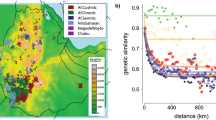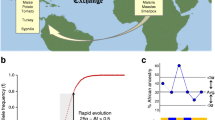Abstract
Analyses of the costs and benefits of immigration have not considered the dependence of an ethny's reproductive fitness on its monopoly of a demarcated territory. Global assays of human genetic variation allow estimation of the genetic losses incurred by a member of a population when random fellow ethnics are replaced by immigrants from different ethnies. This potential loss defines an individual's ethnic genetic interest as a quantity that varies with the genetic distance of potential immigrants. W. D. Hamilton showed that self-sacrificial altruism is adaptive when it preserves the genetic interests of a population of genetically similar individuals. Ethnic genetic interest can be so large that altruism on behalf of one's ethny—'ethnic nepotism'—can be adaptive when it prevents replacement. It follows that ethnies usually have an interest in securing and maintaining a monopoly over a demarcated territory, an idea consonant with the universal nationalism of Bismarck and Woodrow Wilson.
Similar content being viewed by others
REFERENCES
Alesina, A., Baqir, R., & Easterly. W. (1999). Public goods and ethnic divisions. Quarterly Journal of Economics, 114, 1243-84.
Alexander, R. D. (1979a). Darwinism and Human Affairs. The Jessie and John Danz Lectures. Seattle: University of Washington Press.
Bonacich, E. (1973). A theory of middleman minorities. American Sociological Review, 38, 583-94.
Borjas, G. J. (1999). Heaven's Door: Immigration Policy and the American Economy. Princeton: Princeton University Press.
Boyd, R., & Richerson, P. J. (1985). Culture and the Evolutionary Process. Chicago: University of Chicago Press.
Burnham, J. (1975/1964). Suicide of the West: An Essay on the Meaning and Destiny of Liberalism. New Rochelle, NY: Arlington House.
Canovan, M. (1996). Nationhood and Political Theory. Cheltenham, UK: Edward Elgar.
Caton, H. P. (1988). The Politics of Progress: The Origins and Development of the Commercial Republic, 1600-1835. Gainesville: University of Florida Press.
Cavalli-Sforza, L. L., & Bodmer. W. F. (1999/1971). The Genetics of Human Populations. Mineola, NY: Dover.
Cavalli-Sforza, L. L., Menozzi, P., & Piazza, A. (1994). The History and Geography of Human Genes. Princeton, NJ: Princeton University Press.
Connor, W. (1985). The impact of homelands upon diasporas. In G. Sheffer (Ed.), Modern Diasporas in International Politics (pp. 16-46). London: Croom Helm.
Dawkins, R. (1976). The Selfish Gene. Oxford: Oxford University Press.
Eibl-Eibesfeldt, I. (1972/1970). Love and Hate: The Natural History of Behavior Patterns (trans. G. Strachan). Holt, Rinehart and Winston, New York (Original German edition, 1970). Munich: R. Piper.
Eibl-Eibesfeldt, I. (1989/1984). Human Ethology. New York: Aldine de Gruyter.
Eibl-Eibesfeldt, I. (1998). In der Falle des Kurzzeitdenkens [The Trap of Short-term Thinking]. Zürich: Piper.
Francis, S. (1999/1984). James Burnham. Thinkers of our Time. London: Claridge Press.
Goetze, D. (1998). Evolution, mobility, and ethnic group formation. Politics and the Life Sciences 17, 59-71.
Gudmundsson, H., Gudbjartsson, D. F., Frigge, M., Gulcher, J. R., & Stefansson, K. 2000. Inheritance of human longevity in Iceland. European Journal of Human Genetics 8, 743-9.
Habermas, J. (1998). The Inclusion of the Other: Studies in Political Theory. Cambridge, MA: MIT Press.
Haldane, J. B. S. (1955). Population genetics. New Biology (London) 18, 34.
Hamilton, W. D. (1964). The genetic evolution of social behavior, parts 1 and 2. Journal of Theoretical Biology 7, 1-51.
Hamilton, W. D. (1970). Selfish and spiteful behaviour in an evolutionary model. Nature 228: 1218-20.
Hamilton, W. D. (1972). Altruism and related phenomena, mainly in social insects. Annual Review of Ecological Systems 3, 193-232.
Hamilton, W. D. (1975). Innate social aptitudes of man: An approach from evolutionary genetics. In R. Fox (Ed.), Biosocial anthropology (pp. 133-55). London: Malaby Press.
Hamilton, W. D. (1996/1963). The evolution of altruistic behavior. In W. D. Hamilton (Ed.), Narrow Roads of Gene Land. Vol. 1, Evolution of Social Behaviour (pp. 6-8). Oxford: W. H. Freeman. (Originally published in American Naturalist 97, 354-6.)
Hardin, G. (1968). The tragedy of the commons. Science 162, 1243-8.
Hardin, G. (1993). Living Within Limits. Ecology, Economics, and Population Taboos. Oxford: Oxford University Press.
Hardin, G. (2001/1974). Living on a lifeboat [reprinted from BioScience, October 1974]. The Social Contract 12, 36-47.
Harpending, H. (1979). The population genetics of interactions. American Naturalist 113, 622-30.
Harpending, H. H. (2002). Kinship and Population Subdivision. Population and Environment, Hutchinson, J. & Smith, A. D., Eds. (1996). Ethnicity. Oxford Readers. Oxford: Oxford University Press.
Keith, A. (1968/1947). A New Theory of Human Evolution. New York: Philosophical Library.
Landa, J. T. (1994). Trust, Ethnicity, and Identity: Beyond Trading Networks, Contract Law, and Gift-Exchange. Ann Arbor: Michigan University Press.
Lewontin, R. C. (1972). The apportionment of human diversity. In T. Dobzhansky, M. K. Hecht, and W. C. Steere (Eds.), Evolutionary Biology, Vol. 6. (pp. 381-98). New York: Appleton-Century-Crofts.
Light, I., & Karageorgis, S. (1994). The ethnic economy. In N. J. Smelser and R. Swedberg (Eds.), The Handbook of Economic Sociology (pp. 647-71). Princeton: Princeton University Press.
MacDonald, K. (2002/1994). A People that Shall Dwell Alone: Judaism as a Group Evolutionary Strategy, with Diaspora Peoples. Lincoln, NE: iUniverse. Originally published by Praeger Publishers, Westport, CT.
Michod, R. E., & Hamilton, W. D. (2001/1980). Coefficients of relatedness in sociobiology. In W. D. Hamilton (Ed.), Narrow roads of gene land. VolumeII, Evolution of Sex (pp. 108-15). New York: Oxford University Press. (Originally in Nature 288, 694-7.)
Morton, N. E., Kenett, R., Yee, S., & Lew, R. (1982). Bioassay of kinship in populations of Middle Eastern origin and controls. Current Anthropology 23, 157-67.
Parsons, J. (1998). Human Population Competition: The Pursuit of Power through Numbers. Lewiston, NY: Edwin Mellen Press.
Pepper, J. W. (2000). Relatedness in trait group models of social evolution. Journal of Theoretical Biology 206, 355-68.
Rubin, P. H. (2000). Does ethnic conflict pay? Politics and the Life Sciences 19, 59-68.
Rushton, J. P. (1989). Genetic similarity, human altruism, and group selection. Behavioral and Brain Sciences, 12 503-559.
Salter, F. K. (1996). Sociology as alchemy. Skeptic, 4, (1), 50-59.
Salter, F. K. (2001). A defense and an extension of Pierre van den Berghe's theory of ethnic nepotism. In P. James & D. Goetze (Eds.), Evolutionary Theory and Ethnic Conflict (pp. 239-263). Westport, Conn.: Praeger.
Salter, F. K. (2002). Ethnic nepotism as a two-edged sword: The risk-mitigating role of ethnicity among mafiosi, nationalist fighters, middleman, and dissidents. In F. K. Salter (Ed.), Risky Transactions. Kinship, Ethnicity, and Trust (pp. 243-289). Oxford and New York: Berghahn.
Salter, F. K. (in press-a 2002). Introduction: The symposium target paper in broader context. In F. Salter (Ed.), Welfare, Ethnicity, and Altruism. New Data and Evolutionary Theory. London: Frank Cass.
Salter, F. K. (in press-b 2002). Ethnic diversity, foreign aid, economic growth, social stability, and population policy: A perspective on W. Masters and M. McMillan's findings. In F. Salter (Ed.), Welfare, Ethnicity, and Altruism. New Data and Evolutionary Theory. London: Frank Cass.
Salter, F. K. (in preparation 2002). On Genetic Interests.
Service, E. (1962). Primitive Social Organization: An Evolutionary Perspective. New York: Random House.
Simon, J. L. (1989). The Economic Consequences of Immigration. Cambridge, MA: Basil Blackwell.
Smith, J. P., & Edmonston, B. Eds. (1997). The New Americans: Economic, Demographic, and Fiscal Effects of Immigration. Washington DC: National Academy Press.
Spicer, E. H. (1971). Persistent cultural systems. Science 174, 795-800.
van den Berghe, P. L. (1981). The Ethnic Phenomenon. New York: Elsevier.
van der Dennen, J. M. G. (1995). The Origin of War. The Evolution of a Male-Coalitional Reproductive Strategy. Groningen, Netherlands: Origin.
Walzer, M. (1990/1992). What does it means to be an 'American'? In M. Walzer (Ed.), What It Means to be an American, pp. 23-49. New York: Marsilio.
Wiessner, P. (2002). Taking the risk out of risky transactions: A forager's dilemma. In F. K. Salter (Ed.), Risky Transactions. Kinship, Ethnicity, and Trust. Oxford and New York: Berghahn.
Wiessner, P., & Tumu, A. (1998b). Historical Vines: Enga Networks of Exchange, Ritual, and Warfare in Papua New Guinea. Washington, DC: Smithsonian Institute Press.
Author information
Authors and Affiliations
Corresponding author
Rights and permissions
About this article
Cite this article
Salter, F. Estimating Ethnic Genetic Interests: Is It Adaptive to Resist Replacement Migration?. Population and Environment 24, 111–140 (2002). https://doi.org/10.1023/A:1020740703855
Issue Date:
DOI: https://doi.org/10.1023/A:1020740703855




